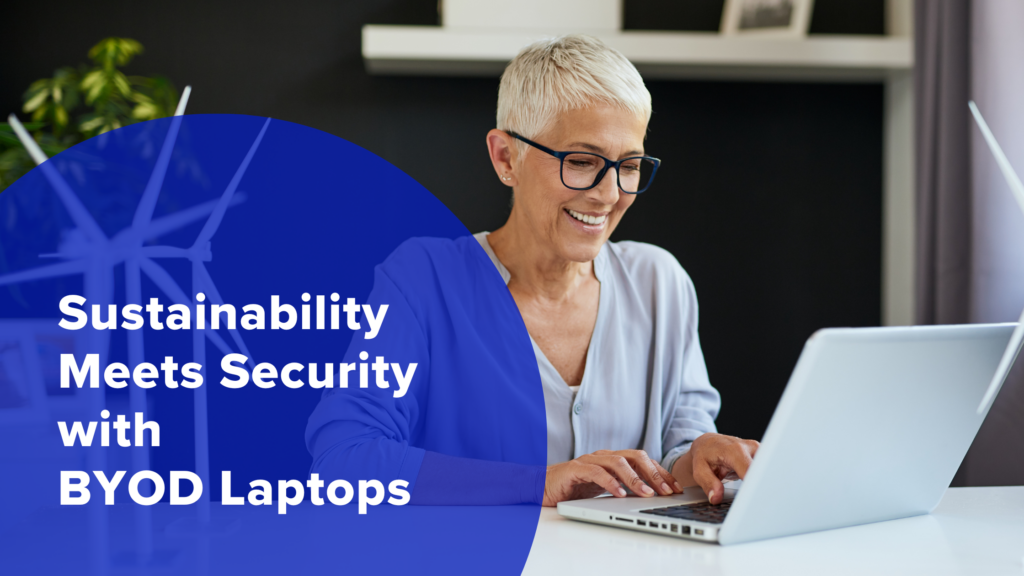In a world where sustainability is increasingly at the forefront of organizational agendas, the quest for greener practices extends beyond traditional domains. A recent article from HRD, “Hybrid work cuts down energy usage, carbon footprint: survey,” highlights the profound environmental benefits associated with remote and hybrid work arrangements, showcasing a substantial reduction in energy consumption and carbon footprint.
The article presented many statistics that underscore the tangible environmental benefits associated with hybrid work models. For example, despite many companies enforcing a return-to-office policy, there is still big interest in further downsizing offices: 79% of employers expressed interest in downsizing existing office spaces or facilitating access to flexible workspaces to further reduce overall energy consumption.
This also reinforces the argument for embracing other sustainable practices in the workplace, such as BYOD policies for laptops. To fully capitalize on this potential, organizations must explore innovative solutions that not only support remote work efficiency but also contribute to sustainability efforts. Is there a way to eliminate the need for purchasing and shipping hardware or supporting and maintaining infrastructure while still keeping work secure? This blog will discuss some of the sustainability benefits along with a new approach for being able to secure remote work.
The Sustainability Benefits of BYOD Laptops
The integration of Bring Your Own Device (BYOD) policies for laptops represents a significant paradigm shift in modern workplaces. As technology continues to permeate every aspect of our lives, the delineation between personal and professional domains has become increasingly blurred. BYOD acknowledges and embraces this reality, empowering employees to utilize their personal laptops for work purposes. This approach not only streamlines workflow but also addresses a pressing environmental concern: electronic waste.
The production and disposal of laptops entail significant environmental costs, contributing to greenhouse gas emissions and exacerbating the global e-waste crisis. The hidden costs and environmental impacts of laptops underscores the urgency of adopting sustainable practices in the realm of technology. With millions of laptops being manufactured and discarded each year, the need for a more eco-conscious approach has never been more apparent.
BYOD for laptops offers a multifaceted solution to these challenges. By leveraging employees’ existing devices, organizations can achieve several key objectives:
- Cost Reduction – Eliminating hardware costs
Embracing BYOD alleviates the financial burden associated with procuring and managing large quantities of new laptops. By leveraging existing devices, organizations can achieve substantial cost savings while minimizing resource consumption. No more shipping and managing laptops or managing a costly VDI infrastructure
- Waste Reduction
By reducing the demand for new laptops, BYOD inherently mitigates the generation of electronic waste. Extending the lifespan of existing devices not only curtails e-waste but also diminishes the need for raw material extraction and manufacturing, thereby lowering carbon emissions.
- Proper Disposal and Recycling
With BYOD, individuals are more likely to take responsibility for the proper disposal or recycling of their laptops. Moreover, companies can seize this opportunity to educate employees on the environmental impact of e-waste and facilitate safe recycling initiatives.
4. Supporting the Corporate Sustainability Reporting Directive
The Corporate Sustainability Reporting Directive (CSRD) is the new EU legislation requiring all large companies to publish regular reports on their environmental and social impact activities. The directive is aimed at driving change in the business behavior of companies that operate in the EU, which includes US companies with EU subsidiaries that meet certain criteria. Companies that embrace BYOD can show a measurable reduction in e-waste as well as other sustainability benefits.
Data Security on BYOD Laptops
However, the implementation of BYOD is not without its challenges. To make it work, IT teams must navigate security and privacy concerns, ensuring robust measures are in place to secure company sensitive data and applications on personal devices.
Secure BYO-PC (Bring your own PC) offers a promising avenue for addressing these challenges. Venn’s Secure Enclave provides a fortified environment within personal devices, effectively separating work-related activities from personal use. With advanced encryption and access controls, it ensures that sensitive corporate data remains protected, even on devices that are not owned or managed by the organization.
By implementing Venn’s Secure Enclave, businesses can enjoy the benefits of BYOD policies without compromising on security. Employees can seamlessly access corporate resources and collaborate remotely while ensuring their work environment is secure and compliant and that data is protected.
Furthermore, Venn’s Secure Enclave facilitates remote device management, allowing IT teams to monitor and enforce security policies across BYOD laptops. From enforcing encryption to remotely wiping data in the event of loss or theft, Venn provides the tools necessary to maintain a secure and productive remote work environment.
Incorporating Venn Secure Enclave into BYOD policies not only enhances security but also contributes to overall sustainability efforts. By extending the lifespan of existing devices and minimizing the need for new hardware procurement, organizations can reduce electronic waste and lower their carbon footprint. With Venn, businesses can compartmentalize work-related activities while preserving personal privacy—a crucial balance in the era of remote work.
In conclusion, the integration of BYOD policies for laptops and a modern new approach for securing remote work with Venn represents a significant step towards sustainability in the workplace. By embracing this paradigm shift, organizations can foster a culture of environmental responsibility while enhancing employee satisfaction and operational efficiency. As we navigate the complexities of remote and hybrid work, let us seize the opportunity to build a greener, more resilient future—one laptop at a time.



